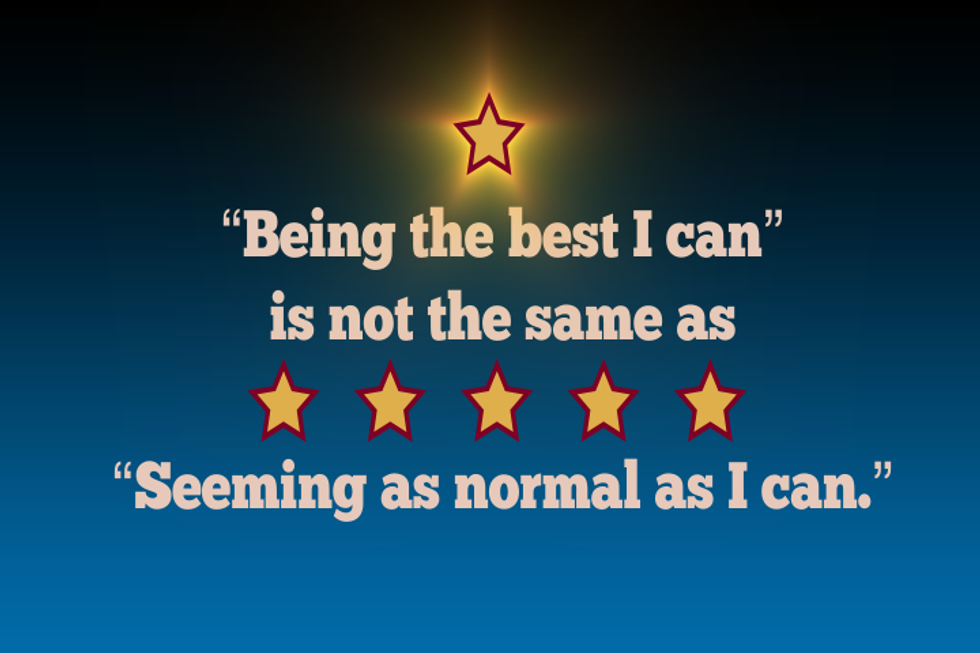"Neurodivergent, sometimes abbreviated as ND, means having a brain that functions in ways that diverge significantly from the dominant societal standards of “normal”... autism and dyslexia are examples of innate forms of neurodivergence." -Nick Walker
Salutations, and welcome to college life.
I'm not going to promise that you can "do it," whatever "it" may look like for your academic plans. I do hope that everything works out for the best, and I believe in you (well, as much as I can believe in someone I do not personally know), but I'm no psychic. I wish I could tell you that you'll find everything you seek from your academic experience if you believe hard enough and work at it, but I know that life isn't always that simple. I thought about droning on for paragraphs about how everyone around me, myself most of all, doubted that an insecure, clueless child-in-a-grownup-body who could barely drive five blocks without having a panic attack, who couldn't make her own phone calls, and who cried at the slightest bit of overwhelm, would ever be able to survive at a university 144 miles away from the comfort of her parent's home. Look at me now, two years later, and still going at it ... but I know that my being neurodivergent doesn't look a thing like your being neurodivergent, and that my experiences are probably nothing like your experiences.
What I mainly want to tell you is this: your experiences are valid, even if they don't match up to what you or others think they should look like.
It's okay to not have the "Hollywood" college experience.
The media paints this intricate picture of college as an interlocking tangle of textbooks and beer kegs and "getting laid" and large friend groups and scantrons and football games and road trips and all sorts of whimsy. Maybe your college experience will wind up reading a bit like that, some do, and it seems to work out for many people. But know that you don't have to have all, or even most of those things to be a "real" college student.
This is the time to make your life your own - that means filling it with the experiences and interests that make you happy, and not filling it with the things that don't (well, to a reasonable extent). You don't have to go to parties or seek out romantic or sexual partners or "do something crazy" for the sake of "making memories." You're allowed to do those things if you want to, of course, but it's by no means required, regardless of what movies and Facebook posts may try to tell you. If your being fulfilled and having fun means, staying in your dorm all day or reading extra textbooks, then go for it. As long as you feel you've accomplished something, at the end of the day, or semester, or year, or at your graduation ceremony. As long as you feel as though you've gained something, you've done everything that you need to do.
It's okay if your workload tolerance is lower than that of some of your peers.
I'm not saying this to doubt your capabilities - I know all too well how much it sucks for people to assume that you're less able than you really are. You can probably do way more and do it way better than many people in your life give you credit for; you're pretty awesome like that.
But I also know all too well how much it sucks to drain yourself of every bit of energy and effort, and still feel like you're accomplishing nothing, compared to the people around you.
It's okay if you're only able to keep up with so many credit hours in one semester. It's okay if you find it difficult to work as many hours as some, while keeping up with those classes - and it's okay if you're unable to hold a job at all, while taking classes. It's okay if you don't have the energy to be involved with many, or any clubs, and its okay if you join several organizations and then later have to scale back some, or all of them. People only have so much energy, and it's totally fine that you can't give all you have, to everything.
Now, don't get me wrong - taking on challenges and putting in some extended effort is necessary for one's growth as a person, and it's generally good practice to exercise one's mental, social, and emotional facilities past one's comfort zone. By all means, take that extra class, help out at that event, apply for that job, go for that promotion, or what-have-you; again, I'm not here to doubt your capabilities in the slightest. But there's a difference between exerting yourself and exhausting yourself, and the latter isn't going to do you any favors down the road. Burnout is real, and it makes it a heck of a lot harder to get to the places you want to go, later down the road.
We're still at the point in our lives when we're learning about ourselves, and you're probably going to start getting a feel for what you can and cannot handle and to what extent. Listen to those feelings and heed them well.
It's okay to be not okay, in your own way.
College is hard. Even if the academic part comes easily and high GPAs rain down on you from the scholastic heavens, there's a lot to deal with. You-the-kid, is now expected to start becoming, You-the-adult. It's a time of transition, of continuously mapping and re-mapping your future. Learning to be competitive in the competitive fields, by taking on opportunities that frighten you. Even if you're successful at them in the end, that chronic battle, to push all of your doubt and insecurity just far enough away, so that you can see five minutes in front of you, is tiring and draining for anyone.
Maybe your being neurodivergent means that you express that tiredness in a way that's "atypical" for "someone your age." Maybe your being tired comes at an earlier stage, or under fewer stimuli, than what you've been told to expect. For me, this takes the form of wearing chewable jewelry to give my teeth something to attack, other than my arms, and also letting myself go to bed at eight some nights (okay, more nights than I'd like to admit). Whatever that looks like for you, it doesn't make you a less capable adult or a less strong person; it just means that you work a bit differently than most people, and that's okay. As put by this image by Landon Bryce from thAutcast:
It's okay to be proud of yourself ... for whatever reasons you so choose.
You may or may not have been lead to believe that you're only allowed to take pride in your grades if they're straight A's or A's and B's. You may or may not have been lead to believe that you're only allowed to take pride in your social skills, if you're constantly surrounded by friends, or if they've helped you to land you some coveted occupational or leadership position. You may or may not have been lead to believe that you're only allowed to take pride in your autonomy if you can do X and Y life skills without assistance and without error.
Those are all things to take pride in, but you know what else is? Effort. Maybe you've studied until your eyes turned red and your fingers grew callouses, and you're still scraping by with a 2.0 GPA. Maybe you've finally gotten the courage to drive across town but still put off phone conversations until indefinitely, if possible (or vise-versa). Maybe you've spent so much energy on all of that, that you simply don't have any left, to go to football games, or meet up with people at the local coffee shop. But, maybe you have a few people you get along well with, and that's enough for you. Maybe your family isn't necessarily satisfied with this (or, heck, maybe they're awesome and support everything about you), but if you feel like you've done well, then you've done pretty well. Chances are, you're learning things that the you of yesterday didn't know, or at the very least, are trying things that the you of yesterday didn't try, and that's something worth taking pride in.
I guess what I'm trying to say under all this ramble is that your college experience isn't (or shouldn't be) about growing into a "more typical" or a "more acceptable" version of yourself. Your college experience isn't about "catching up" to your same-age peers or trying to meet some artificial standard for what someone your age and with your education "should" look like. Your college experience is about learning, living, and expanding your boundaries. And doing so in a way, that plays on your strengths, respects your weaknesses, and actualizes your intentions, your desires, and your being.
So from one neurodivergent scholar to another, welcome aboard. I can't promise you success or satisfaction, but I'll be rooting for you.






















